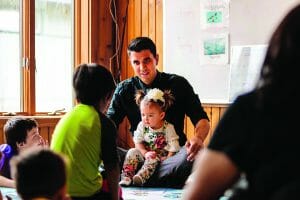Sealaska established a $10 million language endowment to focus on the revitalization of Tlingit (Lingít), Haida (X̱aad Kíl) and Tsimshian (Sm’algya̠x) languages. In Alaska, very few birth speakers of these traditional languages remain. All are older than 70, and a majority are 80 or older. The group includes four birth speakers of Sm’algya̠x, three birth speakers of X̱aad Kíl, and 63 birth speakers of Lingít. We invite you — all 23,000 of our shareholders — to get involved in this important effort to revitalize our languages. If you ever had an interest in learning your language, NOW is the time. Sealaska’s $10 million Language Revitalization Fund is expected to generate $500,000 in grants annually to invigorate Indigenous languages over the next decade.
X̱aad Kíl, the Haida language, holds knowledge of Haida culture and heritage that only those who speak it can access. And yet only about a dozen Native speakers remain, and few opportunities exist for people who want to become fluent speakers.
As in many Indigenous communities, contact with missionaries forced attendance at boarding schools, and other efforts to stamp out the language left entire generations of Haida without access to their Native tongue and the wisdom it uniquely conveys. But the hard work and dedication of passionate community members is starting to reverse the trend.
X̱ántsii Náay Haida Immersion Preschool in Hydaburg is in its third year, serving about 15 Hydaburg children between the ages of 3 and 5. The school is part of a larger language revitalization initiative aimed at preserving X̱aad Kíl.

immersion classes in Hydaburg, Alaska.
The school’s head teacher and director, Benjamin Young, 34, is Haida Raven of the Yahgw’láanaas Clan and his Haida name is K’uyáang. Young learned to speak X̱aad Kíl primarily from his grandfather Claude Morrison (Kúng Skíis), who at the time of his death at age 100 was one of the last remaining Native speakers of X̱aad Kíl in Hydaburg.
“The past year or two have been very big for the language revitalization movement with the opening of three language immersion preschools in Southeast: Yakutat, Juneau and Hydaburg,” Young said. “It’s a very big thing to be able to conduct a school entirely in a target heritage language.”
X̱ántsii Náay follows the Montessori philosophy but is conducted entirely in X̱aad Kíl. That means Young’s day starts not only with preparing the classroom — housed in the former Boys and Girls Club and renovated with clan crest banners and other culturally relevant items — but teaching his fellow teachers the language, too.
Some of the hallmarks of Montessori preschools are in evidence at X̱ántsii Náay: hands-on learning, self-direction, and mentorship of younger students by older ones.
For culturally relevant, hands-on learning, the kids have access to drums, paddles, masks and other items intended to create “a place of serenity for them to be very comfortable with who they are,” Young said.
Students start each day by being greeted at the door in X̱aad Kíl. After putting away coats and boots, they wash hands and brush teeth. (Young said there’s an even greater emphasis on personal hygiene this year due to the coronavirus.) Students spend a little time working on the development of fine motor skills that will enable them to hold a pencil and write their names, and are then guided toward “centers” that include math, language arts, sensory activities and practical-life skills.
Some of the oldest children at X̱ántsii Náay are now able to serve not only as mentors and guides to the younger children, as is the Montessori way, but also as language interpreters to those who haven’t as had much exposure to X̱aad Kíl.
Young credits his wife, Marita Tolson, and her family with making the school possible. They helped renovate the space where X̱ántsii Náay is held, taking it from concept to reality in just a few short months.
Young said the school is part of a larger cultural revitalization under way in Hydaburg.
“The trajectory of this town is going in a great direction,” he said, citing the new longhouse in the community, several fresh totem poles, the Haa Yoo X̱‘atángi Deiyí: Our Language Pathway program through Sealaska Heritage Institute and the University of Alaska Southeast, and new local classes to teach traditional art and design.
Young holds a bachelor’s degree in secondary education from Butler University in Indiana and worked for a time in Ketchikan before returning to Hydaburg. His path to learning X̱aad Kíl started as a young boy in Hydaburg, learning a few phrases “and a whole bunch of nouns” from local Elders. As a young man, he realized his grandfather wouldn’t live much longer and spent five years dedicated to learning the language from him, until his death at age 100. He later studied under the guidance of Gwich’in linguists Hishinlai’ Peter and Jordan Lachler, director of the Canadian Indigenous Languages and Literacy Development Institute at the University of Alberta.
His course of study was self-directed, and didn’t come with a linguistics degree. “Year after year, day after day, week after week, month after month, I got hours and hours and hours of instruction from my grandfather, my own independent study and the linguists I’ve been fortunate to know and study with,” he said.
“I just wanted to pursue what was absolutely meaningful and not what was expedient,” Young said. “I wanted to stop doing feel-good assignments and do something that was really ambitious. That’s why I am where I am today, I guess.”
ABOUT SEALASKA
We are Sealaska, the Alaska Native regional corporation for Southeast Alaska formed under federal law in 1971. With more than 23,000 shareholders of Tlingit, Haida and Tsimshian background, our purpose is to strengthen our people, culture and homelands. We invest in and operate businesses that improve the health of our oceans, maintain healthy homelands in Southeast Alaska, and benefit shareholder communities. Learn more at Sealaska.com and https://www.sealaska.com/community/speak.